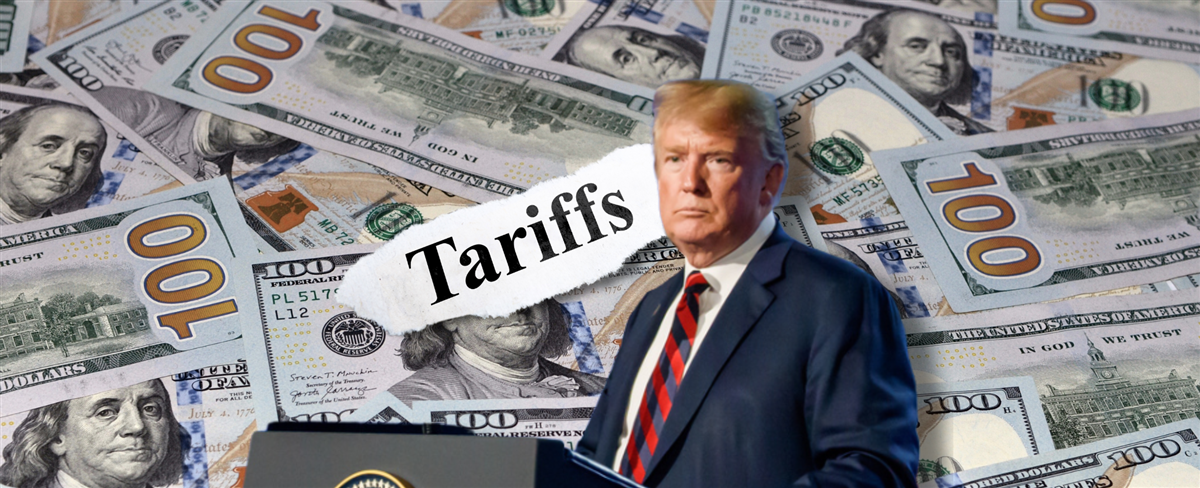
President Trump has stated his intention to place import tariffs on all goods made outside of the United States, supporting his America First initiative. He wants to galvanize the nation's manufacturing industry, which is a boon to factory workers. However, tariffs may stimulate inflation as importers pass the additional expenses onto the customer.
It’s believed that tariffs increase prices and decrease trade. Tariffs are paid by the importers, making it more expensive to buy foreign products, thereby directing business to domestic producers, at least in theory. The problem is that the importers may pass some or all of the costs of new tariffs to consumers.
Stockpiling May Surge Ahead of Trump’s Return
Many "Made in America" companies will see the benefits of Trump tariffs as they gain more inflows. To avoid imminent price spikes, consumers and companies may start stockpiling inventory before Trump takes office. Stockpiling may be triggered in anticipation of Trump's potential 10% to 25% across-the-board tariffs on imports and 60% tariffs on Chinese products. Here are three stocks that could benefit from the stockpiling effect of additional Trump tariffs.
Whirlpool: The Stockpiling Precedent of 2018
Retail/wholesale sector giant Whirlpool Co. (NYSE: WHR) employs over 28,000 Americans to make appliances like refrigerators, dishwashers, ovens, washers, and dryers through eight main manufacturing facilities in the United States. The company is a clear benefactor of the Trump tariffs. However, Trump is also planning on raising the tariffs on foreign steel and aluminum by up to 25%. This will inevitably raise prices for appliances and consumer electronics.
The earlier precedent occurred during Trump's first presidency when he initially applied tariffs on foreign steel and aluminum. U.S. steelmakers enjoyed the influx of revenues but also decided to capitalize on their position and raised their prices as steel prices soared. This actually led to a stifling of demand after 25% tariffs were applied in March 2018. It also led to price spikes for home appliances like washers. Many consumers made their appliance purchases ahead of the new tariffs, saving considerable amounts of money.
If history is to repeat itself, consumers may start upping their purchases of appliances. Contractors and homebuilders may also purchase appliances stockpiling inventories ahead of potential new Trump tariffs even if they plan on selling them later in the year. Whirlpool noted in its Q3 2024 earnings report that sales of major domestic appliances were the weakest in North America, down 4.3% YoY versus the 9.1% gain in Asia.
The stockpiling effect could be a boon for Whirlpool’s Q4 2024 top and bottom results as it would front-load sales that may have been made later in 2025.
Best Buy: A Perfect Storm of AI Upgrade Cycle, Holiday Season, and Stockpiling
Consumer electronics big box store operator Best Buy Inc. (NYSE: BBY) had a weak Q3 2024 as it heads into the holiday shopping season. The sentiment for a new AI-powered electronics upgrade cycle weakened after its Q3 report.
However, the potential for spice spikes from Trump’s new round of tariffs could also result in consumers accelerating their electronics upgrade cycle overlapping with the holiday shopping season, which would make Best Buy a gift for investors in 2025. The impact may be even greater with expectations being reeled in, setting the bar low for the quarter.
Affirm: Financing the Stockpiling Effect in 4 Bi-Weekly Payments
If consumers will be stockpiling ahead of the feared Trump tariffs, they will need to finance their purchases. Affirm Holdings Inc. (NASDAQ: AFRM) has stated that the holiday season is their busiest time of the year as shoppers use their buy now pay later platform to make purchases they otherwise wouldn’t have been able to afford. Affirm directly improves conversion rates for merchants.
Since Affirm makes their fees from the merchants selling the products to consumers, they are a prime benefactor of stockpiling, even more so if they are big-ticket items like home appliances. Consumers who make these purchases kill two birds, as the purchases also double as Christmas presents.














